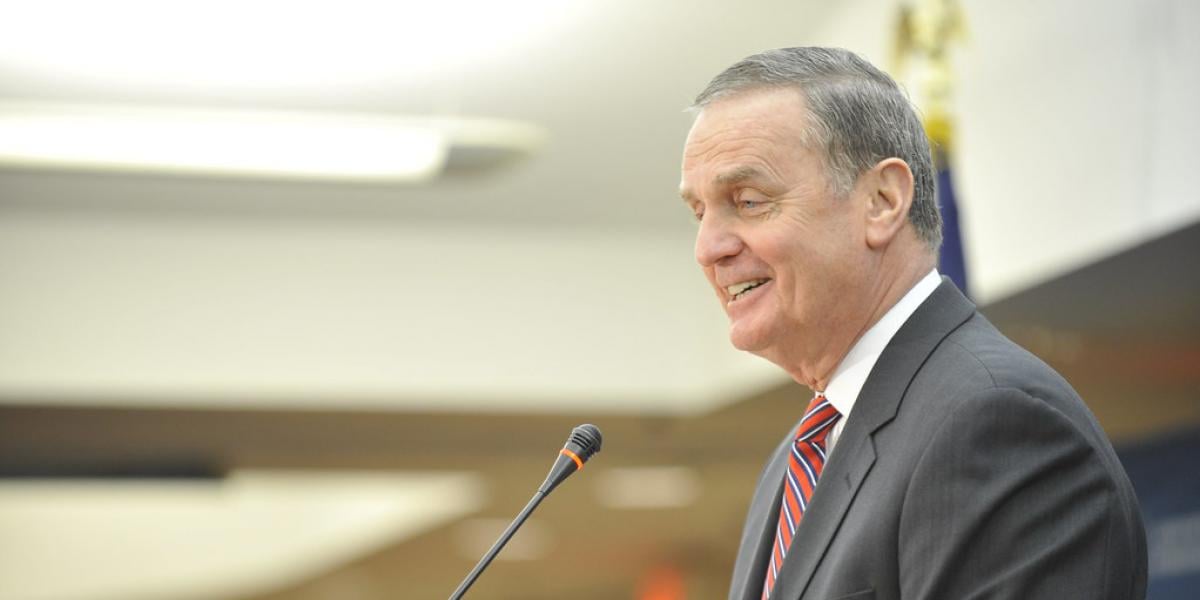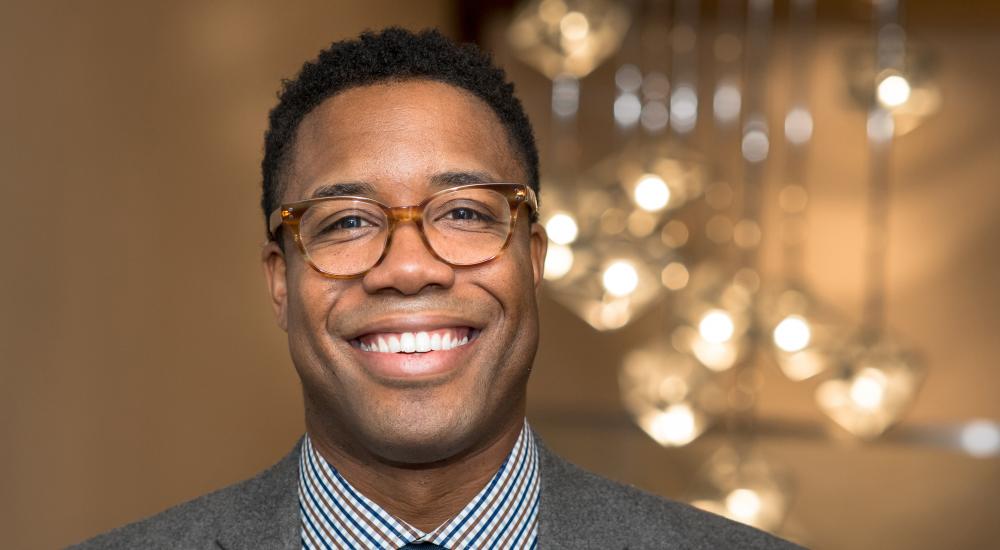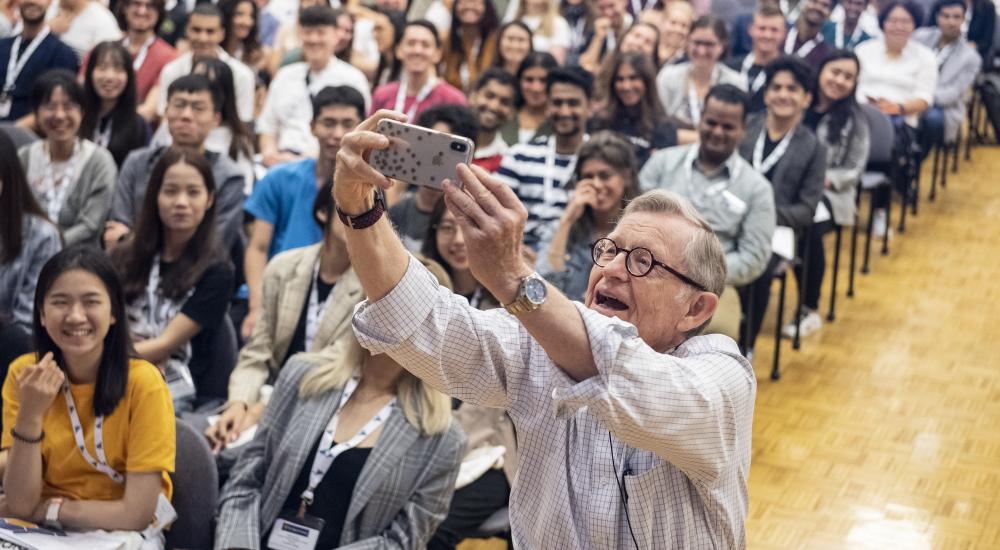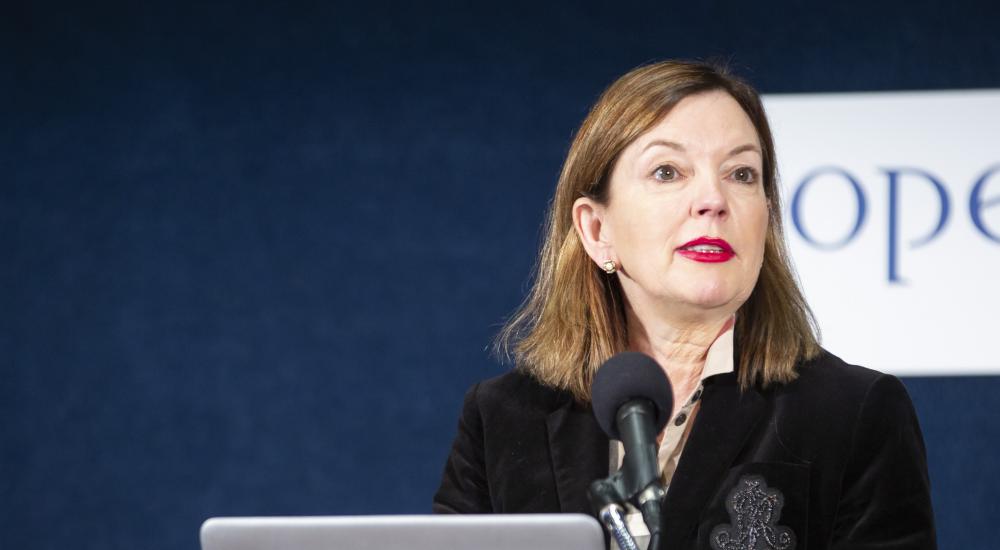General James L. Jones: Leading by Example

Over the span of his career, General James L. Jones, USMC (Ret.), has served as a National Security Advisor; Commandant of the United States Marine Corps (USMC); and Commander, United States European Command and Supreme Allied Commander, Europe (NATO).
Gen. Jones grew up in postwar France, where he had an intimate view of diplomacy in action that informed what would become a life of service. After attending Georgetown University’s School of Foreign Service, he was commissioned into the USMC. Following a distinguished military career, he retired in 2007 and became President Obama’s National Security Advisor in 2008.
An expert in national security, Gen. Jones has deep experience collaborating with and building consensus among people from diverse backgrounds and perspectives—skills that he first developed as an international student in Paris.
Tell us about growing up and attending school in France. In what ways did it shape your worldview?
My family moved to France in 1946. I was born in December 1943, so I was not quite 3 years old. I attended three types of schools. One was a French school in the village that we lived in outside of Paris; it was a parochial school. The second one was 2 years at the [North Atlantic Treaty Organization] NATO school, kind of an international curriculum. And the third one was the American School of Paris, which was also an international school, but largely kind of a prep school for American college.
It got me focused at a very young age on where all these countries were and focused on the aftermath of European reconstruction after World War II. [My classmates] were also children whose families, some of their parents, assisted in the formation of NATO, which was in France at the time. So it really did give me a global view—at least a transatlantic view—because the presence of the U.S. military was everywhere in postwar France.
I got to appreciate firsthand, and see firsthand, how much America contributed to the liberation of Europe, and how much it contributed to the reconstruction of Europe through the Marshall Plan. So at a young age I was conversant with all of that, because that was going on around me. In retrospect, it had a lot to do with what I wound up doing later on in life.
How did that experience directly contribute to your chosen career path?
Most of my peer group were sons and daughters of diplomats and those in the business community, as well as a lot of French friends. Growing up as an American child who was mostly formed by French culture gave me a different feeling of patriotism. I didn’t really know what living in the United States was like because I was too young when I moved to Europe.
Ultimately, it translated into a feeling of wanting to be of service, because so many people that I met when I was younger were service people—people who worked for the foreign service and the military service. They were all doing things for causes greater than themselves. That really had an effect on me that has lasted until this day.
What role can international education and exchange play in the pursuit of global peace and diplomacy?
It’s tremendously important. As a matter of fact, maybe the most important thing is to have access to an education that exposes you to those things—particularly in this century, when world events are moving at a much faster clip. Social media has really transformed the way we gain information and form our opinions, but it also helps to facilitate global communications at the drop of a hat.
For anybody who aspires to a service-oriented career, whether it be in the foreign service, the military service, or the like, you have to have a good grounding of what the world is like and why things are the way they are. I’ve learned that you need to look at problems you’re [facing] from other people’s viewpoints so you can understand where they’re coming from. Oftentimes we lead with our conviction without any thought for other people’s viewpoints, and that’s one of the crowning lessons of our educational system—to understand that you have to follow certain principles.
What is the impact on U.S. diplomacy and national security efforts when international students study in the United States?
I call that insurance for the future. At American University’s School of International Service [where I gave the commencement address], the graduating class had students representing 130 countries, which was remarkable. The more that we encourage that, the more we are “buying insurance,” so that somewhere down the road [when these students become] diplomatic leaders or business leaders or military leaders, we all hearken back to where our roots are.
It’s to our advantage to have as many foreign students here who will have a pleasant experience, get a good education, and go back with a deep understanding, and hopefully a deep affection, for our country, even though they might not live here forever.
After years of growth, international student enrollment in the United States has been on the decline. What should the country do to reverse that trend?
One of the big challenges of the times we’re in, from the U.S. perspective, is to restore the historical affection and admiration in which this country has always been held. The way we speak and the way we drive the global community from Washington these days can be fairly intimidating. It’s almost dictatorial, and it certainly doesn’t build consensus or help coalitions if people in Washington are always criticizing our historical friends and allies. So that’s one area that could change and should change.
The other thing is that the United States has always led by example. I remember a story a German friend of mine told me a few years ago. Like me, he was born just after World War II. He [said] that when other Germans would ask him, “What do you want to do when you grow up?” he would always say, “I want to be an American.”
I felt very proud of what my country had done and what it was capable of doing. My father was a veteran of World War II with the Marine Corps, and his brother was as well. So at a young age, I was pretty well steeped in love of country and pride in who you are and being associated with being an American. That was reinforced by my European friends, frankly. But we’ve lost that, and some of it has to do with the way we talk to people, diplomacy, and other things. I wish we could get back to a more civil discourse.
You are one of the foremost experts on U.S. national security, including its relationships with allies, adversaries, and major powers. What are some examples that you’ve seen in your work that demonstrate the national security imperative of openness and international collaboration?
The entire North Atlantic Treaty Organization I was privileged to work in from 2003 to 2007 is a prime example. In 2003, we had 19 countries in NATO; when I left in 2007, we had 26. Life in NATO—whether you’re in the civilian side or the military side—is a constant reminder that collaboration, finding the common ground, finding the middle ground, finding solutions that work for everyone, is essentially the order of the day.
In a more bilateral way, at the National Security Council, I used to have video teleconferences once a week with the national security advisors from other countries. We would talk about common problems, common challenges, and common solutions. And that’s the only way to advance the causes of civility, peace, and prosperity, is to have that kind of dialogue—and it’s all rooted in the education we get early on.
Mine was accidental, because obviously I didn’t have anything to do with the decision to move to France. But for me, my brother, and my sister, it turned out to be absolutely one of the best things that ever happened because we got our education almost by osmosis, by living there and seeing what was going on around us. There are different ways to get an education, but the important thing is to understand that it is fundamentally necessary and a great value to whatever you do in life.
Would you agree that national security and international education exchange are mutually dependent, not mutually exclusive?
I would say one complements the other. Many people come into the national security business by virtue of an election. One of the weaknesses of our system is that those people learn on the job. If you look at the National Security Council, there were quite a few people who were hired as a result of their political action or their ability to help win an election. But once the election’s over and they get a job in the national security arena or foreign affairs, they find out they’re not as equipped as they thought they were. It’s not something you learn by flipping on a light switch.
One of the things that makes national security such an intriguing profession these days is that it’s much broader than it used to be. It includes such factors as economic security, energy security, and climate security. Anybody who is working seriously in the arena has to know a little bit about everything.
How can international education help the United States compete economically in an increasingly globalized world, especially in areas like Africa?
I think education gives you an awareness, and the more you learn, the more aware you become. One of the big competitions we face is from China. Up until about 2001 or 2002, the United States was the leading economic partner of Africa, and since then, China has overtaken at an astonishing pace and is now by far the leading business-oriented venture in Africa. They’ve done it very skillfully, and we have not responded.
One of the reasons I think we have not responded is because we are still not moving at the pace that the world events are moving. We rebuilt infrastructure and organizations that were good in the cold war, when things were a lot more deliberate. But that’s no longer the case, and I think that we need to seriously think about reorganizing our State Department and our ability to project our goals or values, particularly in business, in different parts of the world.
We’re witnessing the return of autocrats at the expense of democracies. And the difference between these autocrats and the ones of the twentieth century is that these autocrats are smarter, and they know how to use the modern tools of communication and social media. They know how to use the purse strings. They’re very fast—they’re faster than we are, actually, at making decisions because they don’t have to get permission from their legislature. They don’t have checks and balances—they are the checks and balances. And that’s a disadvantage; we’re going to have to figure out how to become more agile so that we can compete with China and others who are moving at a faster rate than we are.
In your considerable leadership experience, what do you think are the qualities that make a good leader, whether in the military, government, private sector, or education?
I would say this applies to all aspects of life that I’ve experienced, but the more senior you get, the more important it is for you to become a good listener and be willing to spend a considerable amount of time building consensus to support ideas.
One of the quick hallmarks of leaders who leave organizations is for them to look back within a year or 2 to see how many things that they started when they were in charge are still working. If you really want to make a long-standing contribution, you need to build support among your subordinates. And you really want people to bond together on these ideas, because if you don’t create that environment, the day after you leave is the first day that people start dismantling what it was that they weren’t included in; they’ve built up antibodies to the longevity of what you tried to do.
The other aspect of leadership that I deeply believe is that the pronoun “we” is much more important than the pronoun “I,” and most successful leaders that I’ve seen have always used “we” to express the direction of the organization. I’ve told all junior officers in the Marine Corps, “You have to remember that the concept of service is not about you. It’s about the common good. It’s about the group.” And you should try to make the best contribution you can, but always remembering that humility, deflecting credit to your subordinates, and having a certain passion for what you’re doing is very important. If you can harness those things, you can do great things.
About International Educator
International Educator is NAFSA’s flagship publication and has been published continually since 1990. As a record of the association and the field of international education, IE includes articles on a variety of topics, trends, and issues facing NAFSA members and their work.
From in-depth features to interviews with thought leaders and columns tailored to NAFSA’s knowledge communities, IE provides must-read context and analysis to those working around the globe to advance international education and exchange.
About NAFSA
NAFSA: Association of International Educators is the world's largest nonprofit association dedicated to international education and exchange. NAFSA serves the needs of more than 10,000 members and international educators worldwide at more than 3,500 institutions, in over 150 countries.
NAFSA membership provides you with unmatched access to best-in-class programs, critical updates, and resources to professionalize your practice. Members gain unrivaled opportunities to partner with experienced international education leaders.















